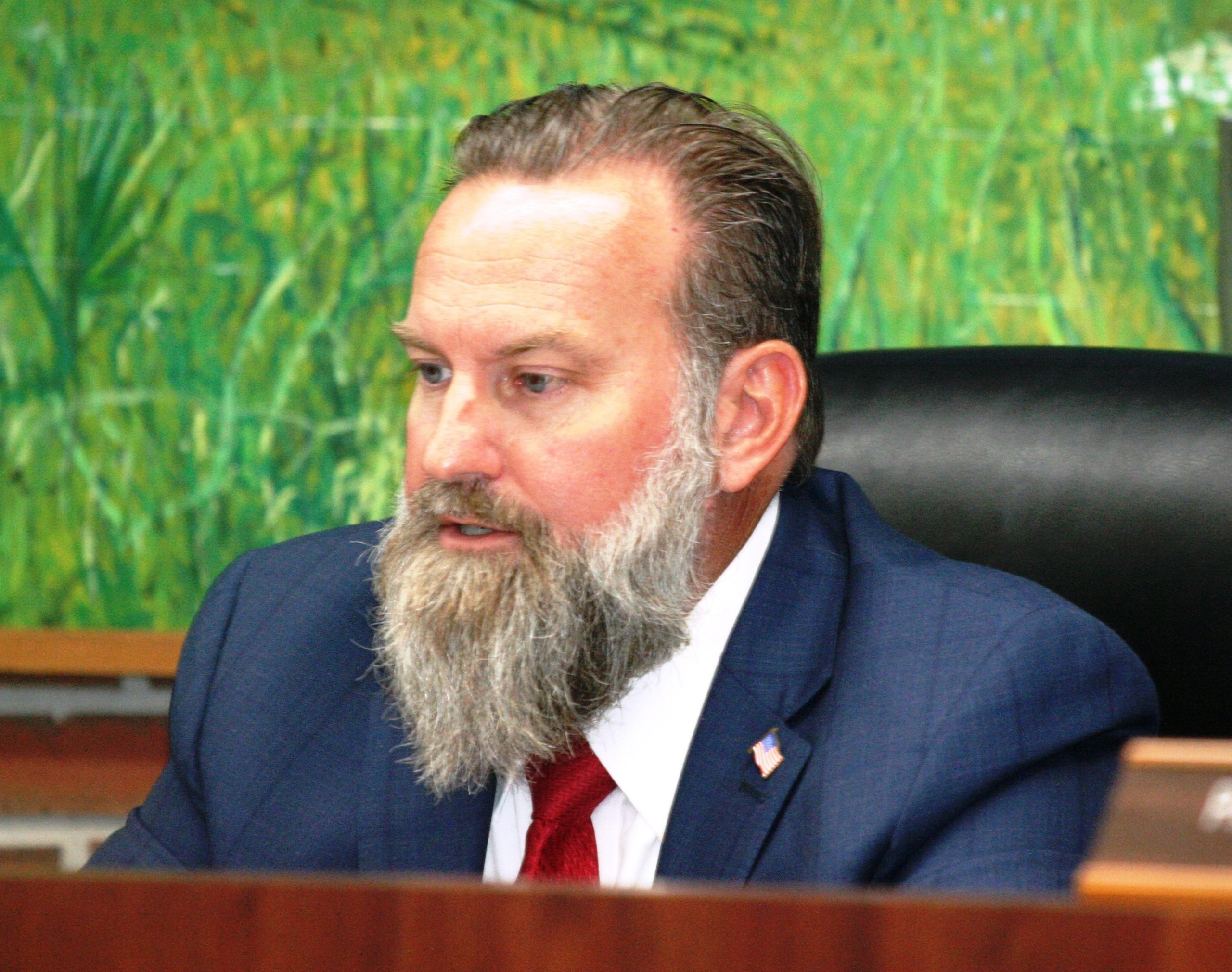Sheriff Bobby McCallum said his school resource officers bear an enormous responsibility deciding whether to Baker Act students in Levy County Schools.
By Terry Witt – Spotlight Senior Reporter – Part IV – Series discussing Baker Acts in Levy County Public Schools.
In a small county like Levy, few people realize that deputy sheriffs frequently must shoulder the full weight of deciding when a student might be mentally ill or a threat to themselves or other people when it comes using the Baker Act. Most small school districts can’t afford to hire licensed mental health professionals for each school.
Sheriff Bobby McCallum said his deputies are receiving training on mental health issues and the state continues to send down mandates for law enforcement officers to be educated on the subject of student and adult mental health. He is abiding by those orders and giving his deputies as much training as is required to meet the state mandates.
McCallum is keenly aware that deputies are not psychologists, psychiatrists or clinical social workers. They do the best they can with the training they have, sometimes in difficult situations at the school.
McCallum anticipates the Mobile Response Units that Meridian Behavioral Healthcare is bringing to the school district this year will allow trained mental health professionals to reach students before a deputy with minimal training must decide whether to Baker Act that student. The mobile response units must arrive within an hour of being called, he said.
Legislative Mandates
“A lot of everything is moving in that direction legislative-wise. We’re getting mandate after mandate. I feel pretty comfortable all our our law enforcement and most of the detention personnel – detention deals with it around the clock – were well trained and the training becomes more involved,“ McCallum said. “I never really feel comfortable with the situation, but I feel comfortable with the training we’ve been provided. Our personnel, we are pretty much up to date on that, but this is an ever evolving situation.”
McCallum was read the ground rules for Baker Acting a student or adult as explained by Dr. Maggie Labarta, CEO of Meridian Health Care, including the fact that there must be an underlying mental health issue and that student doesn’t know they are mentally ill before a school resource officer determines whether to Baker Act a student. Labarta said many times people skip over the mental health part and go straight to the question of whether the student is a threat to themselves or others.
Threats to Self or Others
“But the primary ones we’re going to deal with, where our basis is, is when they make a threat to do harm to themselves or others,” McCallum said. “We know that mental illness has to be the underlying factor. The things that trigger us the most because we’re not doctors, is the fact that if they made a threat to harm themselves or others or are exhibiting some of those signs that we recognize as lay people with the minimal training we have in crisis intervention, and with mental health, which is increasing all the time; I think we’ve come a long way with that. We just completed 40 hours of crises intervention training (in June) that the Florida Sheriff’s Association provided, that we had here. That’s our second go around.”
McCallum estimated that 70 percent of his law enforcement officers and detention staff and all of his school resource officers have been through the training. Meridian doctors are also being brought to the sheriff’s office to help with that training.
“Our crisis intervention training is a multitude of mental health professionals that come in and present their knowledge and train our deputies,” said Lt. Scott Tummond, the sheriff’s office public information officer. “Not just a select few – all of us.”
Continuous Retraining Mode
McCallum said Dr. Joyce Carbonell, a clinical psychologist and professor of psychology for 35 years at Florida State University works through the sheriff’s association to train deputies in mental health issues. She has provided much of the training for the Levy County Sheriff’s Office.
Tummond said deputies are in retraining mode every year. They must take the courses to wear the badge and remain certified as deputies.
“Part of that is mental health. We understand that right now there is a mental health crisis and that’s being driven by a multitude of factors but predominantly people who abuse narcotics which alters their state of mind,” Tummond said.
Autistic Children
He added that the way the school district is structured the schools have special needs students that have some type of documented health issues that runs the gamut.
“Whether we’re talking about a student with autism – you start going from A to Z with that – these students are part of the mainstream part of Levy County schools, but they have special classroom assignments and they have special teachers,” Tummond said. He added that deputies have received training in how to deal with the different levels of autism.
McCallum said a new state law requires mental health assessment teams and threat assessment teams in schools. He said as far as he knows, all of those are in place. He knows that threat assessment teams are in place because the sheriff’s office participates in active threat drills at the schools every month.
Handcuffing Students
The sheriff said most of the Baker Acted Levy County students are transported in handcuffs in the back of a patrol car to the Meridian Crisis Stabilization Unit in Gainesville, but sometimes Meridian may be full and the students might be taken to the University of Florida psychiatric hospital, formerly known as VISTA. The Meridian CSU is a receiving facility for law enforcement agencies in this region, not just Levy County.
McCallum and Tummond were asked if the sheriff’s office transports any Baker Acted students to the Meridian child Crisis Stabilization Unit in Lake City.
“We’re not transporting any of our Baker Acted patients to Lake City,” Tummond said. “Every one of them is going to Gainesville. Now it depends on, in route if we get rerouted to Shands, or we take them to the Crisis Stabilization Unit at Williston Road (Meridian); everything has to do with bed space and the availability of a treatment team to receive that person.”
At the school level, McCallum said the school resource officer may get directly involved in the Baker Act at the very start of a crisis, or school personnel may bring a student forward to be interviewed by the deputy.
“If this student is acting out from behavioral issues rather than mental health issues, if a student is acting out, that’s one thing; the deputy’s got to determine or a law enforcement officer must determine if it’s a mental health issue with this child or is it a threat to themselves or someone else, “McCallum said. “If it’s a true mental illness as you say, if we’re told they are hearing voices and all this kind of stuff, that will cross that line. Our main criteria that we look at up front initially if we hear those words, I’m going kill myself, I feel like killing myself or a school buddy or whatever, that’s an automatic trigger.”
Different Behaviors
Tummond said the deputies are working on school campuses where there are students with documented medical problems. Deputies may observe behavior that results from their medical diagnosis, “meaning if you have an autistic child and he is way up on the autistic scale, sometimes words don’t have the meaning to them, they’re just words. So our deputies are making an assessment; are the words a manifestation of his diagnosis or do the words have real meaning and we’re going to have an issue where this child may try to harm themselves.”
“Absolutely,” McCallum added. “We’re not going to Baker Act someone because they are autistic unless they meet the criteria that goes along with the illness.”
Tummond said an autistic child may be having a bad day because his schedule was upset.
“Sometimes it’s only five minutes and the child is starting to have a meltdown. School staff, our school resource deputy will take that student, separate them from the rest of the school populace and then get the parent over there and get them involved and see if we can calm the matter,” Tummond said. “Just because we have an autistic child who is making statements that in another sense might be Baker Act criteria, we’re not Baker Acting the child. We’re getting them the help they need; a lot of times it’s just having Mom and Dad show up.”
Baker Act Authority
McCallum said the sheriff’s office has made it clear that it is the responsibility of the school resource officer to determine if the child truly meets the criteria to be Baker Acted.
“A lot of times it’s tough calls. It’s tough, but the teacher can’t Baker Act, the teacher can’t order a deputy to Baker Act, it doesn’t work that way. The law is not set up that way. Now if a doctor or a parent goes to the court and gets an ex parte order for that child, we’re going to pick that child up if a judge orders it,” McCallum said. “We’re dealing with this every day. The autism training, all our deputies and resource deputies and all deputies are required to have autism training and we’ve had that.”
McCallum described the 40 hour course his deputies received in June as well-rounded and encompassing mental health training. He said it was excellent training.
The sheriff said Baker Acted students are handcuffed and transported in a patrol car.
“I’m not going to say 100 percent they are handcuffed, but I would say 99.9 percent they’re going to be handcuffed. I know of many cases where they are not, and again, it’s for their safety and the deputy’s safety and they are transported in a patrol car. What else are we going to transport them in?” McCallum said.
Are Students Traumatized?
The sheriff said he doesn’t think children are traumatized by being Baker Acted and transported in handcuffs in the back of a patrol car.
“Not if it’s handled the way we try to handle it. We try to explain, especially the school resource deputy, why this needs to happen and why it is policy to do that,” McCallum said.
McCallum said the sheriff’s office had a case last year where a middle school kid that was 6 feet 6 inches tall (he may have been held back a couple of grades) pushed and kicked his teacher. The middle school boy did the same thing with a family member.
“I don’t want to get too specific. Deputies talked to him. Obviously he’s going to be handcuffed. I think we had a female deputy transport him. It didn’t matter. He was a big boy; he could do some damage,” McCallum said. “We handle every situation based on what the situation is putting on us. That child, obviously we care about that child. We’re trying to do the best we can for them. We don’t want to give them an opportunity to do harm to themselves or the deputy in transport.”
Baker Acts, Record Keeping
“It’s our responsibility to transport Baker Acts. Period,” McCallum said. The statute says it’s the county‘s responsibility. When they say the county it’s us. We have to do it.”
McCallum said the sheriff’s office keeps a record of the Baker Acts. The records would describe why the student was Baker Acted and what led to the Baker Act. The deputy documents what actions he or she took and why. The records are confidential. The name of the student and anything that would identify the student is protected.
Heavy Weight on Deputies
Deputies have a huge weight on their shoulders to make certain they are correctly applying the Baker Act statute lawfully and in a proper way, McCallum said.
“That’s a heavy burden on us and the deputy. We want the best, especially for a child or anybody we want the best outcome and the best possibility for health and improvement in that person’s mental health status, but you’ve got so many things driving so much. That’s a huge weight, it’s a huge weight on us as an agency and deputies and school resource deputies,” McCallum said.
McCallum said his office has created a more detailed way of tracking Baker Acts to be able to release numbers that accurately reflect how many occurred during the school year. The reports indicate whether the sheriff’s office completed a student Baker Act, whether a student was assessed by a school resource officer but did not meet Baker Act criteria, whether a student threat assessment was performed, whether a school security drill was performed.
The sheriff said a decision was made to add these categories of documentation following a public records request by Spotlight.
McCallum was asked who receives Baker Act reports from the sheriff’s office.
Documenting Baker Acts
Tummond said the sheriff’s office submits a report on every Baker Act to the Crisis Stabilization Unit.
“We are required by law to give a statement that meets the statutory definition of why we’re Baker Acting that individual. They have that statement before we walk out the door. Otherwise we don’t walk out the door,” Tummond said.
Challenging Circumstances
McCallum said school resource deputies sometimes find themselves in extremely challenging circumstances when children start acting out at school.
We’re trying to protect these kids but word spreads, they hear the noise, the beating on the walls; I mean, I’ve been there when they had three. You would have thought you were in a, I don’t know what, laying on the floors, beating on the walls, kicking on the walls, all that. Nobody is trying to embarrass the kids. Just the opposite,” McCallum said. “If you walk out the door and that child takes off running, at least if they are in handcuffs we have a chance of catching them.”
McCallum said the instant the student is talking about doing harm, it crosses the line and they may get Baker Acted. He said there is no attempt to embarrass them.
“It may look bad, but it’s not to embarrass the child, it’s to protect the child and anyone involved,” McCallum said.
State of Mind
The young people the sheriff’s office deals with regarding Baker Acts are coming into their prime. Tummond said some students are strong as an ox compared to the deputies trying to keep things under control at the school.
“We’re dealing with a 6 foot 5 inch autistic child. They’re not in a normal state of mind and they are unpredictable and they’re strong as an ox. We’re past old. We’re not in our prime. They’re just coming into their prime. They have some underlying condition that may not have been identified yet,” Tummond said. “People who are not in a state of mind like the rest of our society is in, they don’t feel pain the way we feel it, they don’t have that mechanism that makes them stop when things become too painful; they don’t have that mechanism in their mind that (says) – I should not kick this person again because it’s wrong – and they kick them and they hurt us. If we can’t get them from point A to point B without hurting the deputy in the transport we’re accomplishing nothing.”
———
Part III – Series discussing Baker Acts in Levy County Public Schools, LCSO State Mandates
Posted August 31, 2019













